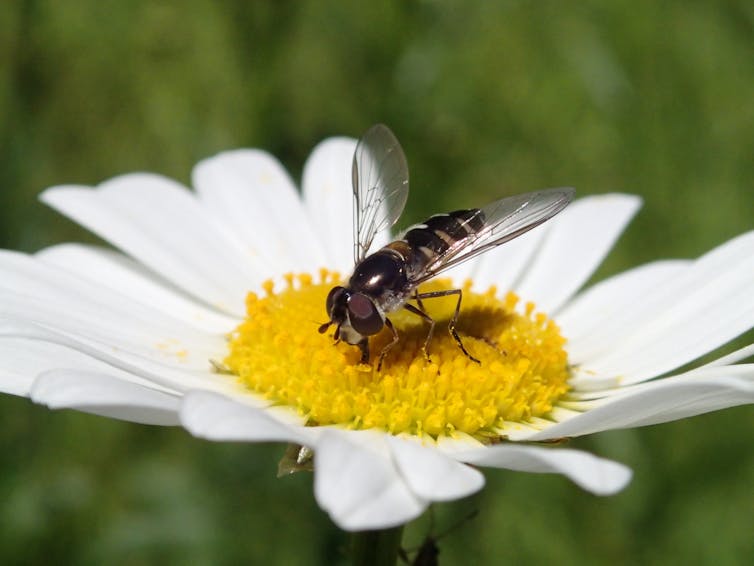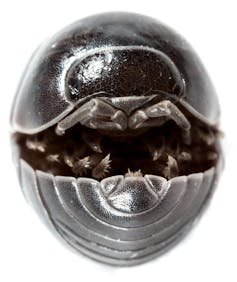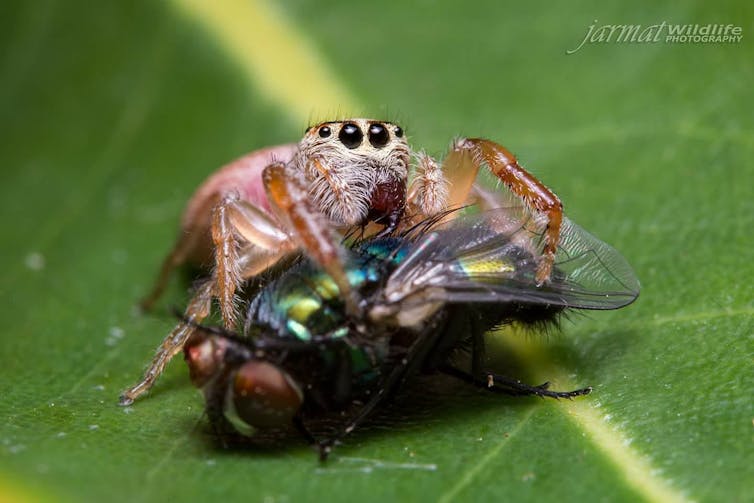Five reasons not to spray the bugs in your garden this summer
The weather is getting warmer, and gardens are coming alive with bees, flies, butterflies, dragonflies, praying mantises, beetles, millipedes, centipedes, and spiders.
For some of us it is exciting to see these strange and wonderful creatures return. For others, it’s a sign to contact the local pest control company or go to the supermarket to stock up on sprays.
But while some bugs do us very few favours – like mozzies, snails and cockroaches – killing all insects and bugs isn’t always necessary or effective. It can also damage ecosystems and our own health.
There are times when insecticides are needed (especially when pest populations are surging or the risk of disease is high) but you don’t have to reach for the spray every time. Here are five good reasons to avoid pesticides wherever possible, and live and let live.
1. Encourage the bees and butterflies, enjoy more fruits and flowers
 Hover fly. dakluza/flickr
Hover fly. dakluza/flickr
Flowers and fruits are the focal points of even the smallest gardens, and many of our favourites rely on visits from insect pollinators. We all know about the benefits of European honey bees (Apis mellifera), but how about our “home grown” pollinators – our native bees, hover flies, beetles, moths and butterflies. All these species contribute to the pollination of our native plants and fruits and veggies.
You can encourage these helpful pollinators by growing plants that flower at different times of the year (especially natives) and looking into sugar-water feeders or insect hotels.
2. Delight your decomposers, they’re like mini bulldozers
 Slaters improve your soil quality. Alan Kwok
Slaters improve your soil quality. Alan Kwok
To break down leaf litter and other organic waste you need decomposers. Worms, beetles and slaters will munch through decaying vegetation, releasing nutrients into the soil that can be used by plants.
The problem is that urban soils are frequently disturbed and can contain high levels of heavy metals that affects decomposer communities. If there are fewer “bugs” in the soil, decomposition is slower – so we need to conserve our underground allies.
You can help them out with compost heaps and worm farms that can be dug into the ground. It’s also good to keep some areas of your lawn un-mowed, and to create areas of leaf litter. Keeping your garden well-watered will also help your underground ecosystems, but be mindful of water restrictions and encouraging mosquitoes.
3. An army of beneficial bugs can eat your pests
Mantises and dragonflies are just some of the hundreds of fascinating and beautiful bugs we are lucky to see around our homes. Many of these wonderful creatures are predators of mozzies, house flies and cockroaches, yet people are using broad-spectrum insecticides which kill these beneficial bugs alongside the pests.
It may sound counterproductive to stop using pesticides in order to control pests around the home, but that’s exactly what organic farmers do. By reducing pesticides you allow populations of natural enemies to thrive.
Many farmers grow specific plants to encourage beneficial insects, which has been shown to reduce the damage to their crops.
This form of pest control in growing in popularity because spraying can result in insecticide resistance. Fortunately, it’s easy to encourage these bugs: they go where their prey is. If you have a good range of insects in your yard, these helpful predators are probably also present.
 Jumping spiders are great at eating flies and other pests. Craig Franke
Jumping spiders are great at eating flies and other pests. Craig Franke
4. Your garden will support more wildlife, both big and small
Spraying with broad-spectrum pesticides will kill off more than just insects and spiders – you’re also going after the animals that eat them. The more insects are around, the more birds, mammals, reptiles and frogs will thrive in your backyard.
Baiting for snails, for example, will deter the blue-tongue lizards that eat them, so cage your vegetables to protect them instead. Keeping your garden well-watered, and including waterbaths, will also encourage a balanced ecosystem (but change the waterbaths regularly).
5. You and your family be happier and healthier
Engaging with nature increases well-being and stimulates learning in children. Insects are a fantastic way to engage with nature, and where better to do this than in your own back yard! Observing and experimenting on insects is a wonderful teaching tool for everything from life cycles to the scientific method. It will also teach your kids to value nature and live sustainably.
It’s also a hard truth that domestic pesticides present a significant risk of poisoning, especially for small children.
In reality, the risk of exposing your children to the pesticides far outweighs the nuisance of having a few bugs around. Instead, integrated pest management, which combines non-chemical techniques like cleaning of food residues, removal of potential nutrients, and sealing cracks and crevices, is safer for your family and your garden ecosystems.
Think globally, act locally
Your backyard has a surprising impact on the broader health of your neighbourhood, and gardens can make significant contributions to local biodiversity. Insects are an important part of ecosystem conservation, and encouraging them will improve the health of your local environment (and probably your health and well-being too).
![]() In the end, insects and spiders are not out to get you. For the sake of our kids and our environment, you should give them a chance.
In the end, insects and spiders are not out to get you. For the sake of our kids and our environment, you should give them a chance.
Lizzy Lowe, Postdoctoral researcher, Macquarie University; Cameron Webb, Clinical Lecturer and Principal Hospital Scientist, University of Sydney, and Kate Umbers, Lecturer in Zoology, Western Sydney University.
This article was originally published on The Conversation. Read the original article.
